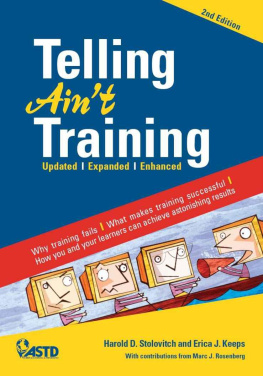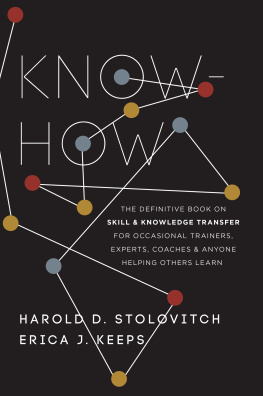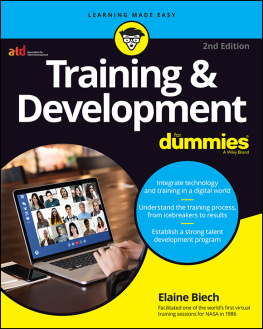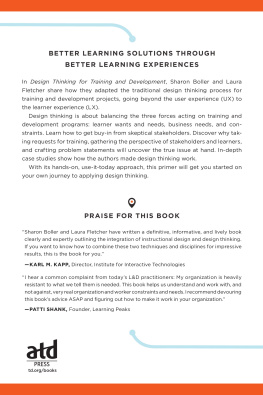More Praise for This Book
A brilliantly accessible guide to developing training that works! This book brings the best of current academic thought to the practitioner in a conversational, practical, and usable format. The endnotes are a phenomenal resource for anyone who wants to dig deeper. Simply superb.
Bonnie Beresford
Vice President, Client Services, Capital Analytics
Ive been recommending this book for years to my staff, my students, and friends who work for nonprofits. Its the most accurate and easy-to-read book for anyone who wants to help someone learn. The new section on technology is especially helpful for those of us involved in online learning. And my doctoral students will love this updated version with more than 300 references.
Petti Van Rekom
Professor, Training and Performance Improvement, Capella University
Director of Online Learning, Iowa Writers Online
It is hard to improve on their original, wonderful training guide, but Stolovitch and Keeps have managed to do just that. This edition of Telling Aint Training identifies changes organizations must make to meet modern workplace skill and knowledge improvement challenges. The endnotes are exceptional. What a treasure trove of scientific and professional resources for additional research and reading! Telling Aint Training is an essential resource for trainers.
Connie Denicola
Instructor Development Manager,
National Center for Biomedical Research and Training
Praise for the First Edition
A critical topic delivered in a compelling way. I can see how this book will elevate the conversation about learning and performance.
Allison Rossett
Professor of Educational Technology, San Diego State University
This practical, innovative, and well-researched book on how we all learn is an invaluable tool for all learning and performance professionals. As a former vice president of training and change management, I would have made the book mandatory reading for trainers, coaches, and managers, had it existed. Well done!
Michel Desjardins
Senior Vice President, BDC Consulting Group,
Business Development Bank of Canada
This is a great book that will change your perceptions about teaching. I have always listened carefully to what Harold and Erica have to say on this subject. Now I have what I always wanteda readily accessible Harold and Erica. A convincing, fun, and interesting read.
J. Kimball Dietrich
Associate Professor, Finance and Business Economics,
University of Southern California
I believe in Telling Aint Training so much that I have ordered five copies and am going to do a book study with the five trainers we have in our district. I am so excited to get the opportunity to share the information from your book with my trainers. I feel they will benefit and be brought up to the next level.
Kenyon Boswell
Technology Training Supervisor, Katy Independent School District
I wanted to let you know how your book, Telling Aint Training, has positively transformed a companys training program and me! The most exciting part has been the comments from the new hires who have gone through the training: Its so organized, Its so easy to understand, This is the best training Ive ever been through. The most incredible part is the feedback from the current staff concerning the high level of the new hires after training and also the fact that the current employees are so intrigued with the new training that they want to go through it themselves! Thank you for such an enlightening, easy-to-understand, transformational book!
Pamela Sullivan
Recognition and Retention Consultant, PS Sullivan & Co.
I have just finished reading your book Telling Aint Training, and I wanted to drop you a note to commend you on an excellent book. I have been reviewing considerable literature for the past few years, and I think your publication is one of the clearest, most straightforward publications I have come across in a long time. I am recommending that everyone in our training organization review it because it serves as a great tool to bring everything together.
Steve Sniderman
Performance Improvement Consultant, Global Education & Training,
Global Sales Division, Amway
Readers Share How Telling Aint Training, First Edition, Was Used in Their Organizations
At Merck Sharp and Dohme (New Zealand), we drew together a group of people who are involved in the training and education of others and began monthly forum sessions based around Telling Aint Training and Training Aint Performance. The main changes have come from the growing awareness within the group that they should be performance based and learner centered. It has significantly changed the way they see their roles, and, in particular, caused them to go back to the drawing board to look at what they are trying to achieve and why. In almost all cases, my group has changed its approach from being trainers to improvers of performance. When they do put together training they now carefully consider how to best enable people to learn as opposed to just attending a course.
We used to have a calendar of typical training workshops that either consisted of too much material being transmitted or too many activities that were superfluous and didnt result in performance improvement. So our trainers are now starting with the learners and what they need to know and do and are then designing training and other performance support to enable it. The result has been less but more relevant training, less money, and the content and structure match the performance outcomes required.
I laminated a simple, brightly colored card for each person that simply reads Performance Based and Learner Centered. Ive noticed that everyone has it above their desk as a reminder for their educational efforts and workplace conversations. Weve already seen new learner-centered materials being produced together with shorter modules in formats that maximize retention and learning. Thank you for a couple of outstanding books that have been written in a way that walks the talk!
Rob Bialostocki
Learning and Development Manager, Merck Sharp and Dohme (New Zealand)
I am a teacher of developmental English at Baltimore City Community College. My students often have deficits in more areas than just grammar and mechanics. Their skill deficits often include the behavioralnot so much bad behavior, but lack of self-esteem. Few of my students feel comfortable working in a group. Even fewer know how to address a speaker or form a good question.
When I returned from the Arlington, Virginia, Telling Aint Training workshop, I immediately employed the Press Conference technique in my class. The only modification I made was that I coached students on taking turns to ask questions and in ways to pose questions politely.
The technique demonstrated a remarkable amount of potential in my students. They were far more comfortable working in groups and asking questions after they participated in the exercise. I feel that, with more practice, I will be able to apply the technique in my class with aplomb. Thank you for teaching me how to conduct Press Conferences in the training/instructional classroom.
Carole Quine
Associate Professor, English, Baltimore City Community College (USA)
I organized a book club for about 25 trainers dispersed throughout my company. Because training is very decentralized here, we dont really have many opportunities to share experiences or learn from one another. By choosing












